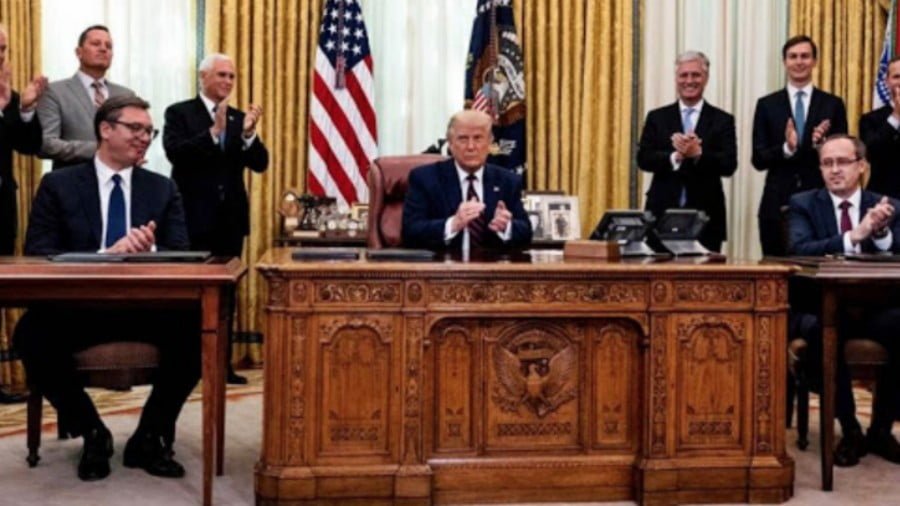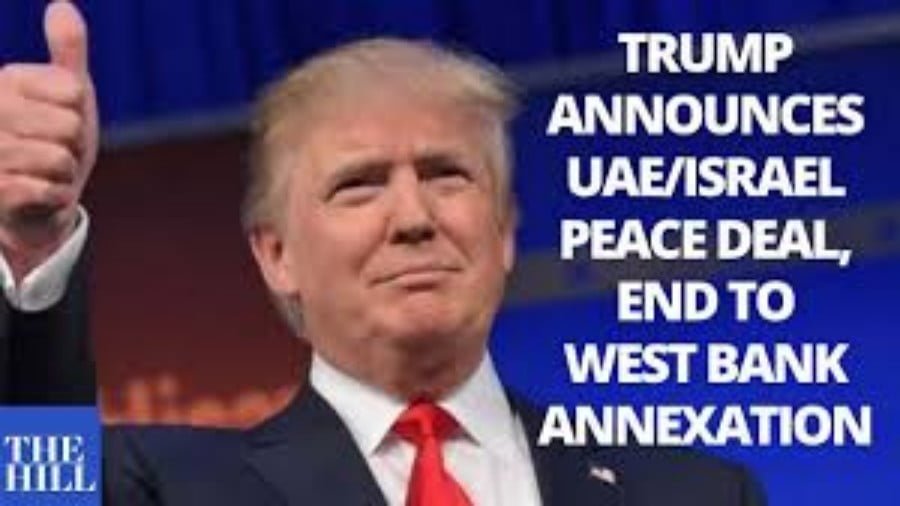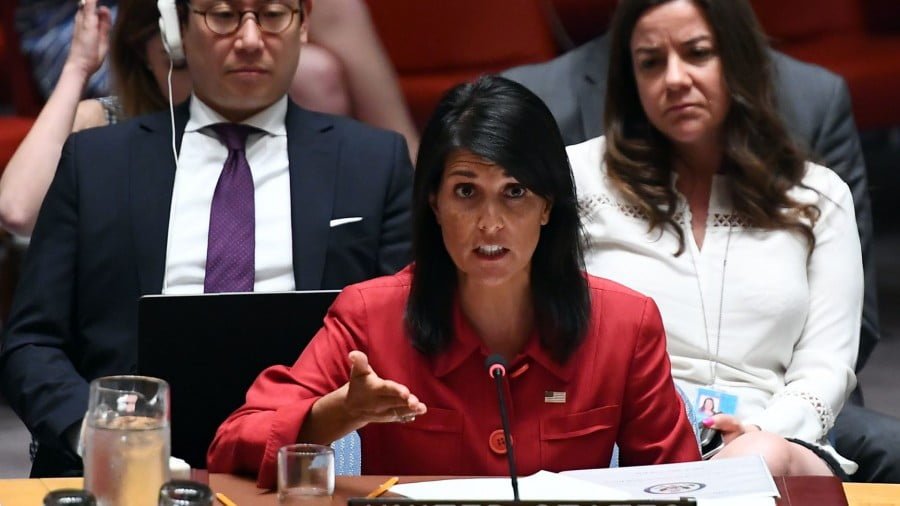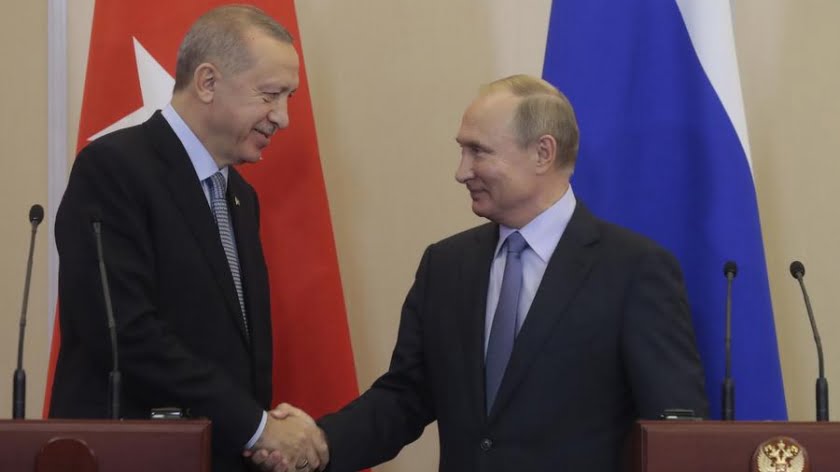What Exactly Connects the White House, Jerusalem, Belgrade and Pristina?
There is a new, ironic joke making the rounds on Serbian social networks these days: What do a Serb and a Kosovo Albanian say to each other now when parting? Next year in Jerusalem! This seemingly incongruous specter of two non-Semitic peoples mouthing the traditional Jewish prayer is directly connected to one of the most important – and controversial – outcomes of the “historic,” agreement on “economic normalization” signed by the president of Serbia, Aleksandar Vucic, and the “prime minister” of “Kosovo” (Serbia’s autonomous province, which unilaterally proclaimed its independence in February 2008), Avdullah Hoti, signed in the presence of a beaming Donald Trump in the White House on September 4, 2020.
Namely, besides the expected infrastructure deals, commitment to a regional free trade zone dubbed as the “mini-Schengen,” and matters related to energy and telecommunications (more on that later), the agreement also covered non-economic matters such as a one-year moratorium on seeking membership in international organizations (“Kosovo”) and in lobbying for “Kosovo’s” de-recognition or blocking its recognition (Serbia), freedom of religion and protection of religious sites, missing persons and the resettling of refugees and internally displaced people. But these could still be explained as being relevant to the consequences of the Kosovo conflict of the late 1990s.
However, the parties also agreed to join the US global crusade to decriminalize homosexuality in the 69 countries that are still holding out, to designate Hezbollah as a terrorist organization and, sensationally, to mutual recognition with Israel (“Kosovo”) and moving their embassy to Jerusalem (Serbia in writing and “Kosovo” in a subsequent oral pledge to Benjamin Netanyahu).
Most observers of international affairs have at least a rudimentary familiarity with the Kosovo issue, one of the world’s main unresolved conflicts of the past quarter century or so, the roots of which run back hundreds of years into the past. In brief, Kosovo Field (or the Field of Blackbirds) was the site of a monumental clash between Serbian and Ottoman Turk forces on June 28, 1389, in which both the Serbian and the Turkish rulers were killed, but which was subsequently enshrined as a Serb national myth/covenant, symbolizing willingness to fight for one’s freedom in the face of overwhelming odds and choosing the heavenly over the earthly kingdom. After the Ottomans finally overran Serbia and that part of Europe some 70 years later (it took them a while to recover, while the Serbian state was fatally weakened under the usual pressure from both west and east) – eventually reaching the gates of Vienna – Albanian converts to Islam gradually settled today’s Kosovo, using their newly gained privileges to repress or push out the former Serbian Christian population. The Serbian Army liberated Kosovo 523 years later, during the First Balkan War, incorporating it into Serbia and then Yugoslavia. Fast-forwarding to the early 1990s, using the Kosovo Albanians as a tool of weakening Yugoslavia and Serbia and deposing its leader Slobodan Milosevic, the US threw its support behind the terrorist Kosovo Liberation Army (KLA) and, under the guise of NATO, bombed Serbia in the spring of 1999. The bombing ended with the adoption of UN Security Council Resolution 1244 of June 10, 1999, by which Kosovo and Metohija (the official name of the Serbian autonomous province) remained a part of Serbia pending a final peace agreement. However, after multiple failed negotiations and supported by most Western and Islamic countries, Kosovo Albanian leaders unilaterally declared independence on February 17, 2008, which Serbia – along with the BRICS countries, among others – has refused to recognize to this day.
So how, exactly, did Israel and Jerusalem become one of the centerpieces of an agreement between two non-Jewish warring sides thousands of kilometers removed from the Holy Land?
That is a question that is still being hotly debated, not just in Serbia and “Kosovo.” The “known knowns” are that Vucic had already made a commitment of sorts during the annual AIPAC conference in Washington DC in March of this year, pledging to open a Serbian Chamber of Commerce office as well as Serbia’s “official state office” in Jerusalem “very soon.” But that is still short of an embassy. On the other hand, per The Times of Israel, “Kosovo” has been “publicly courting Israel since before its declaration of independence from Serbia in 2008,” but “Israel refused to recognize Kosovo because it did not want to support a unilateral declaration of statehood, which Jerusalem feared could create a dangerous precedent followed by the Palestinians.”
Contributing to the “known unknowns” is the now-viral video, seen by at least a couple of hundred million viewers globally if we include China (more on that later) showing Vucic’s apparent puzzlement at Trump’s announcement of the Serbian embassy move to Jerusalem. Vucic subsequently claimed to Serbian media that this was entirely due to an inadvertent switch of folders given to him and the Kosovo Albanian leader and that he was entirely familiar with what he had signed. But that doesn’t explain Vucic’s subsequent assertion that the embassy move to Jerusalem would be contingent on Israel “being attentive to Serbia’s interests” and his appeal to Israel to “carefully consider its decisions” regarding mutual recognition vis-à-vis “Kosovo.” Especially because the last item of the agreement he signed in the White House explicitly states: “Serbia [Belgrade] agrees to… move its Embassy to Jerusalem by July 2021.”
Vucic’s position is further complicated by the Oval Office telephone conversation between Netanyahu and Hoti immediately after the signing ceremony, in which it was affirmed that “Kosovo” would indeed open its embassy in Jerusalem, as the “first Muslim-majority nation to do so.” So much for attentiveness to Serbia’s interests. But, again, the wording in the document is clear, so it would seem that Vucic’s own interpretation is nothing more than damage control for his own domestic audience.
And there is damage to be controlled, doubtlessly. For Vucic has not only implicitly agreed to another major state’s recognition of the secession of Serbia’s historic province, he has also undermined Serbia’s own international position on the matter. Namely, by signing on to an agreement to move the Serbian embassy to Jerusalem, Vucic is violating UN SC Resolution 478, which calls upon all UN member states to withdraw their diplomatic missions from Jerusalem, as Israel’s “basic law” on the Holy City “constitutes a serious obstruction to achieving a comprehensive, just and lasting peace in the Middle East.” On the other hand, for more than two decades Serbia has been invoking UN SC Resolution 1244, according to which Kosovo is an integral part of Serbia, pending a final peace agreement between the sides, and has the support of countries making up the majority of the world’s population behind it. So, in effect, Vucic might be seen as practicing the same double standard against which he has railed in the past, (rightly) accusing Western states of advocating “rule of law” while violating international law themselves when they recognized “Kosovo’s” independence.
All this leads to one of two conclusions: either the item concerning the embassy move was inserted without Vucic’s knowledge – hence his stunned expression on the above-mentioned video – or Vucic knew that he’d agreed to something he shouldn’t have agreed to and is now simply using brazen denial as a survival tactic.
In any case, it is clear that the main beneficiaries of the Serbia-“Kosovo” agreement were both Israel and Trump, who used the opportunity to promote himself as not only a peacemaker but also to show that he could succeed where Biden previously not only failed but acted as a warmonger, having been a leading advocate of the NATO bombing of Yugoslavia and Serbia in 1999. In addition, Trump scored a major pre-election point with the powerful and wealthy pro-Israel lobby, and will build on this further by hosting the Israel-UAE diplomatic normalization agreement on September 15.
What remains to be seen is what Vucic – and Serbia – have gained from the help extended to Trump and Netanyahu. What is certain is that Vucic’a troubles do not end with the announced Jerusalem embassy move, or with the rather humiliating seating arrangement he was afforded in the Oval Office during his individual meeting with Trump, which has made him the object of much derision in Serbia. For, among the things both parties signed on to is to “diversify their energy supplies” as well as “prohibit the use of 5G equipment supplied by untrusted vendors in their telecommunications networks.”
The part pertaining to energy is clearly aimed at Russia and the Turkish Stream/Balkan Stream gas pipeline that is slated to become fully operational by the beginning of next year. The part regarding 5G equipment is even more clearly aimed at China’s Huawei. Both countries are not only Serbia’s allies but increasingly important economic and military partners. Officially, both Moscow and Beijing have not reacted negatively to the agreement, although Russian foreign minister Lavrov did somewhat pointedly emphasize that Russia will support “all voluntarily reached agreements between Belgrade and Pristina.” However, private and scattered media reactions by various Russian political figures tell a somewhat different story, from openly wondering what exactly is going on with Vucic, to pitying him as a “rape victim.” Which is why the Serbian prime minister immediately rushed to assure both Belgrade’s important partners that “nothing was clearly defined (in the agreement), which allows Serbia to create a more strategic partnership with the US without compromising the country’s cooperation with China and the Russian Federation… The agreement opens a new door, without closing all others.”
And that is indeed another strange aspect of this strange document – no one is quite sure what to make of it, whether it’s a full-fledged international agreement, or just a glorified memorandum of understanding or intent. For his part, the main public facilitator of the deal, former US ambassador to Germany and Acting Director of National Intelligence Richard Grenell, made sure to underline that the US is “not a signature” to the agreement. On the other hand, as noted above, Vucic is treating it as something open to interpretation while Netanyahu is treating it as a binding agreement, as is Grenell, who openly ridiculed a Politico reporter quoting the Serbian foreign minister’s relativization of the part of the agreement concerning the embassy move to Jerusalem as a sign that the Serbian government is “stepping back from the embassy pledge.” The plot thickened a bit further when the Israeli press carried reports claiming that Serbia wouldn’t move its embassy to Jerusalem after all if Israel were to recognize “Kosovo,” specifying that a “diplomatic relationship” between the two is acceptable but that full recognition would “destroy” Israel’s ties with Belgrade.
As for Trump himself, he’d probably already mentally moved on to the next urgent items on his agenda before the ink on the signatures had even dried. It should be noted, however, that there may be more to Trump’s interest in reaching some sort of Serbia-“Kosovo” normalization than just pure electioneering, as witnessed by his son’s Tweet from March of this year, calling for the remaining 650 US troops stationed in “Kosovo” to be brought back home.
In any case, no matter the true nature of the agreement, one can be sure that the main beneficiaries to the agreement, Israel and the US, will certainly insist on the fulfillment of what was written, while pushing for the most favorable interpretation of the parts that were supposedly “not clearly defined.” Russia will certainly have questions regarding his commitments not only regarding energy supplies and Kosovo and Metohija but Serbia’s declared military neutrality as well – especially after Serbia, citing “terrible pressure” from Brussels, suddenly decided to cancel joint military exercises with Russia and Belarus (as well as with all other partners for the next six months). China will wonder just how secure its “steel friendship” with Serbia really is and whether Serbia will be the next domino to fall in the US’s global crusade against Huawei. And Hezbollah cannot be too happy either, along with Iran and Syria, both of whom have not recognized “Kosovo.” For his part, Vucic will continue trying to balance between playing for his domestic audience and meeting the expectations of major international players from both East and West and various commitments made in the increasingly hostile global geopolitical environment. As the Belarusian president has recently learned, pursuing a “multi-vector” foreign policy without being at least a major power is an uncertain and often perilous game in today’s world.







